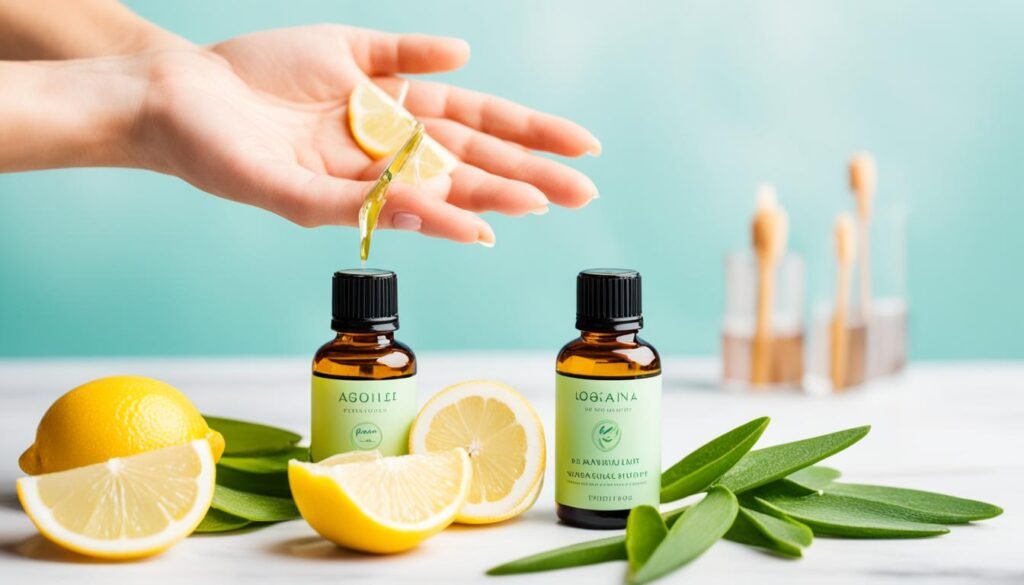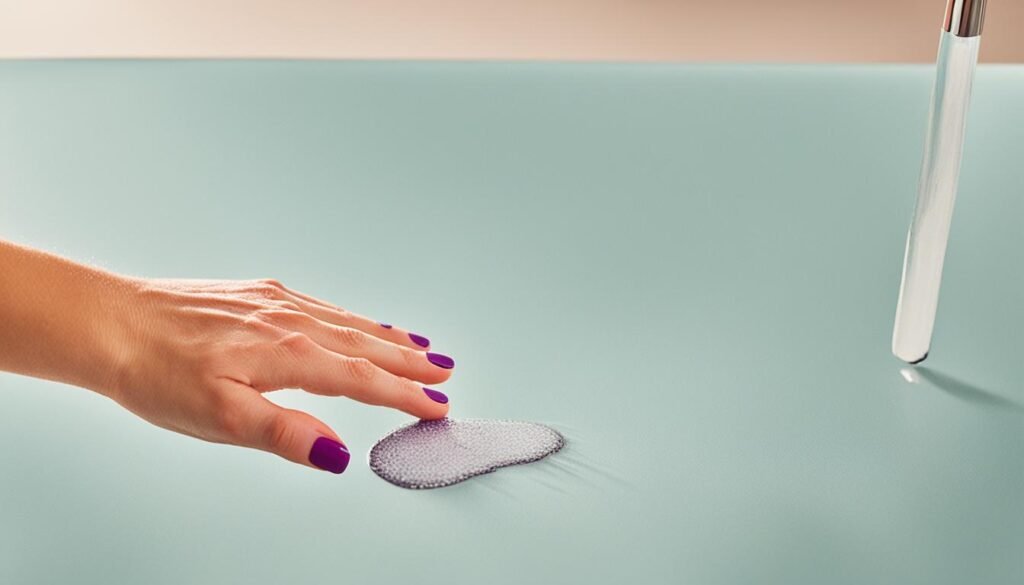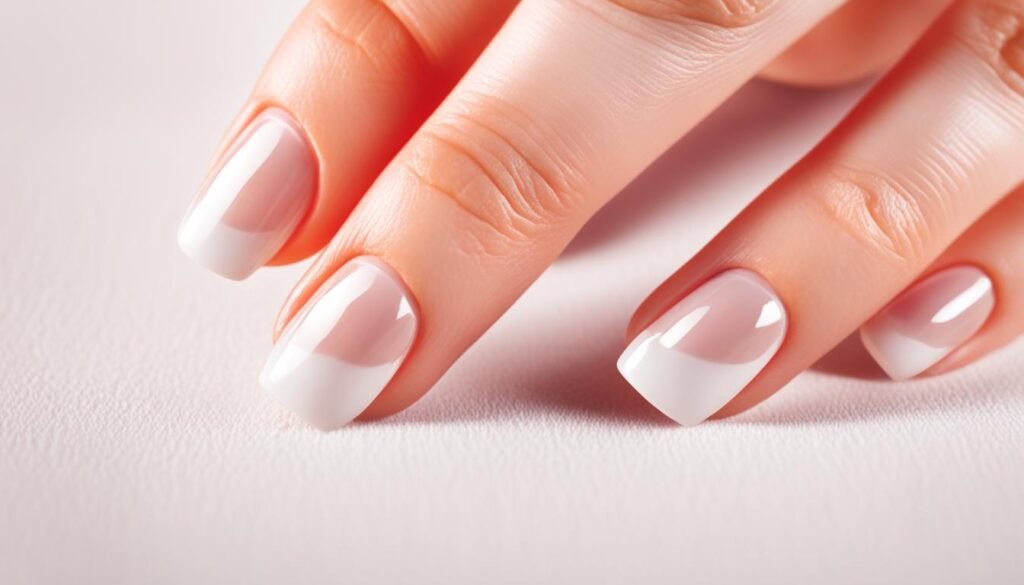Do you struggle with weak, brittle nails that break and chip easily? Are you tired of hiding your nails under layers of polish and acrylics? It’s time to uncover the secrets to strong, healthy nails and regain your confidence. In this article, we’ll explore effective solutions for strengthening brittle nails, sharing expert tips and advice to help you achieve the nail health you desire.
Key Takeaways:
- Weak nails can be caused by various factors, including aging, environmental exposure, and routine manicures.
- Moisturizing your nails and hands regularly can help protect and strengthen them.
- Keeping your nails short and properly filing them can prevent breakage and maintain strength.
- Avoiding harsh chemicals, such as acetone, and minimizing water exposure are essential for nail health.
- Considering dietary changes and biotin supplements can promote nail strength from within.
Signs your nails may be damaged
Damaged nails can show various signs that indicate the need for better care and attention. If you notice any of the following signs, it’s a clear indication that your nails may be weak, damaged, or in need of improvement:
- Weakening of nails
- Brittleness
- Tendency to break easily
- Dryness
- Dullness
- Chipping or peeling
If you’re experiencing any of these signs, it’s important to take action and make changes to your nail care routine. By adopting habits that promote stronger nail health, you can prevent further damage and enhance the overall condition of your nails.
Here’s an image that highlights the signs of damaged nails:
Moisturize your hands and nails regularly
One of the most effective ways to improve the health and strength of your nails is by moisturizing them regularly. By nourishing your nails and the surrounding skin, you can prevent further damage and promote overall nail health. It is recommended to use hand creams or nail moisturizers that are specifically formulated to hydrate and protect the nails.
When choosing a moisturizer, opt for products that contain ingredients known for their hydration properties, such as shea butter, jojoba oil, and vitamin E. These ingredients help to lock in moisture and prevent the nails from becoming dry and brittle. One highly recommended product is the L’Occitane Nourishing Nail & Cuticle Oil, which provides intense hydration and nourishment for the nails and cuticles. Another effective option is the Aquaphor Healing Ointment, known for its moisturizing properties that can help strengthen and protect your nails.
When applying moisturizers to your hands and nails, massage them gently onto the surface of your nails and the surrounding skin. This helps to improve blood circulation and promote better absorption of the moisturizing ingredients. Make sure to pay special attention to the cuticles, as they are prone to dryness and are an important part of maintaining nail health.
Incorporating regular moisturizing into your nail care routine can make a significant difference in the strength and appearance of your nails. By keeping them properly hydrated, you can reduce the risk of breakage, splitting, and peeling, and achieve healthier, more resilient nails in the long run.
Keep your nails on the shorter side
While long nails may be visually appealing, keeping them on the shorter side can actually help build their strength. Shorter nails are less prone to breaking because there are fewer exposed edges to tear, and less surface area where water and chemicals can be absorbed.
Trimming your nails regularly and gently rounding the edges with a nail file can help prevent snags and maintain their strength.
Here are some benefits of shorter nails:
- Reduced vulnerability: With shorter nails, there are fewer exposed edges that can catch and tear, reducing the risk of breakage.
- Minimized water and chemical absorption: Longer nails have more surface area, making them more susceptible to water and chemical absorption, which can weaken the nails. Keeping your nails shorter can minimize this risk.
- Lower maintenance: Shorter nails require less maintenance and are generally easier to care for compared to longer nails.
To maintain shorter nails:
- Trim your nails regularly: Use a sharp nail clipper to trim your nails to the desired length. Be sure to cut straight across rather than in a rounded shape to prevent ingrown nails.
- Gently file the edges: After trimming, use a nail file to gently round the edges of your nails. This will help prevent snags and potential breakage.
Remember, everyone’s nail length preference may vary, so find the length that suits you best. Shorter nails can still be beautiful and well-maintained, while also promoting nail strength and overall nail health.
Tips from the experts
“Maintaining shorter nails can be beneficial for those looking to strengthen their nails. Shorter nails are less likely to snag, break, or absorb water and chemicals that can weaken them. Trimming and filing regularly can help keep your nails in a healthier state.” – Dr. Jessica Adams, Dermatologist
By keeping your nails on the shorter side, you can enhance their strength and reduce the risk of breakage. Don’t be afraid to rock shorter nails – they can still be stylish and chic while promoting nail health.
Become a nail filing master
Proper nail filing is essential for maintaining strong and healthy nails. By following the proper nail filing technique, you can avoid damage and promote nail strength.
First, make sure to use a soft nail file that won’t cause tears or peeling. A gentle nail file like the Deborah Lippmann Smooth Operator 4-Way Nail Buffer is highly recommended by experts for its effective yet gentle filing action.
When filing your nails, always remember to file in one direction with long and gentle strokes. Avoid using rougher grains or sawing back and forth, as this can weaken the nails and cause them to peel or develop hangnails.
By filing your nails in one direction with a soft nail file, you’ll be able to shape them easily and smoothly without causing damage. This simple technique will help you achieve beautifully filed nails while maintaining their strength and health.
| Proper Nail Filing Technique |
|---|
| Step 1: Choose a soft nail file, such as the Deborah Lippmann Smooth Operator 4-Way Nail Buffer. |
| Step 2: File your nails in one direction with long and gentle strokes. |
| Step 3: Avoid using rougher grains that can cause tears and lead to peeling and hangnails. |
Ditch nail polish removers that contain acetone
Nail polish removers that contain acetone can be harsh on weak nails, causing them to become dry and brittle. Opt for acetone-free nail polish removers like Tenoverten Non-Acetone Polish Remover, which is gentle on the nails and cuticles. Avoiding acetone-based removers can help prevent peeling, splitting, and white, mottled marks.
When it comes to removing your nail color, choosing the right nail polish remover is crucial for maintaining the health and strength of your nails. Acetone-free nail polish removers are formulated without the harsh chemical solvent acetone, which can strip the nails of their natural oils and moisture, leading to dryness, brittleness, and damage. By opting for acetone-free alternatives, you can effectively remove your nail polish without compromising the health and integrity of your nails.
Acetone-free nail polish removers, like Tenoverten Non-Acetone Polish Remover, are specifically designed to be gentle on the nails and cuticles. They are formulated with nourishing ingredients that help to condition and hydrate the nails, preventing them from becoming dry and brittle. Additionally, these removers are less likely to cause peeling, splitting, and white, mottled marks, which are common side effects of acetone-based removers.
By making the switch to acetone-free nail polish removers, you can ensure that your nail care routine promotes strong and healthy nails. Incorporating this simple change into your beauty regimen can help you achieve beautiful, long-lasting manicures while keeping your nails in optimal condition.
Don’t overuse hand sanitizer
While hand sanitizer is an essential tool for maintaining hand hygiene, excessive use of alcohol-based sanitizers can have adverse effects on your nails. The high alcohol content in hand sanitizers can dry out the nails, leading to brittleness and weakness. To minimize the impact on your nail health, it is important to use hand sanitizer in moderation and take certain precautions.
If possible, opt for using hand sanitizer wipes instead of liquid or gel sanitizers. Wipes minimize direct contact with the nail area, reducing the potential drying effect. Additionally, consider moisturizing your hands and nails after using hand sanitizer to counteract its drying effects. Using a nourishing hand cream or cuticle oil can help restore moisture and keep your nails healthy.
Remember, hand sanitizer is not a substitute for proper hand hygiene. Regular handwashing with soap and water for at least 20 seconds is still the best way to eliminate germs and maintain hand health.
To further protect your nails, consider using alternative hand hygiene methods that do not involve alcohol-based sanitizers. Look for gentle, non-alcohol hand sanitizers that contain moisturizing ingredients like aloe vera or glycerin. These alternatives provide effective germ protection while being less harsh on your nails.
By being mindful of your hand sanitizer usage and incorporating alternatives, you can maintain hand hygiene without compromising the health and strength of your nails.

Tips for Using Hand Sanitizer Responsibly:
- Use hand sanitizer only when soap and water are unavailable.
- Apply a small amount of hand sanitizer, enough to cover all surfaces of your hands.
- Rub your hands together, ensuring that the sanitizer reaches all areas.
- Avoid touching your face or nails immediately after using hand sanitizer to minimize drying effects.
Hand Sanitizer Alternatives:
| Alternative | Description |
|---|---|
| Aloe vera hand sanitizer gel | Gentle on the skin and nails, with added moisturizing benefits of aloe vera. |
| Alcohol-free hand sanitizing wipes | Convenient and portable, these wipes provide on-the-go sanitizing without the drying effects of alcohol. |
| Antibacterial hand soap | Regular handwashing with antibacterial soap and water is an effective alternative to hand sanitizer. |
| Salicylic acid hand sanitizer | Formulated with salicylic acid, this hand sanitizer helps exfoliate dead skin cells and promote healthy nails. |
Pay attention to your diet
Overlooking the importance of a balanced diet can significantly impact the health of your nails. By incorporating specific nutrients into your meals, you can promote stronger and healthier nails. Here are some key dietary considerations for optimal nail health:
Protein and Calcium for Stronger Nails
Protein is a vital building block for healthy nails. It helps to repair damaged tissues and promotes the growth of new cells. Including protein-rich foods like lean meats, eggs, fish, and dairy products in your diet can provide the necessary amino acids for strong and resilient nails.
In addition to protein, calcium is essential for maintaining nail strength. Calcium contributes to the overall health and structure of nails, preventing them from becoming brittle or prone to breakage. Incorporate calcium sources such as dairy products, leafy greens, and fortified foods into your daily meals.
Biotin-Rich Foods for Nail Strength
Biotin, also known as vitamin B7, is a key nutrient for promoting nail strength and growth. It helps to improve the thickness and durability of nails, reducing the risk of brittleness and breakage. Foods rich in biotin include eggs, legumes, nuts, and leafy greens. Including these biotin-packed items in your diet can help enhance the health and appearance of your nails.
Hydration for Optimal Nail Moisture
Staying hydrated is crucial for maintaining healthy nails. Dehydration can lead to dry and brittle nails, making them more prone to breakage and damage. Ensure you drink an adequate amount of water throughout the day to keep your nails moisturized from within.
Dietary Recommendations
Below is a table outlining recommended foods and nutrients for healthy nails:
| Nutrient | Food Sources |
|---|---|
| Protein | Lean meats, poultry, fish, eggs, dairy products |
| Calcium | Milk, cheese, yogurt, leafy greens, fortified foods |
| Biotin | Eggs, legumes, nuts, leafy greens |
| Hydration | Water, herbal teas, fruits, vegetables |
By paying attention to your diet and incorporating these nail-friendly nutrients, you can nourish your nails from within and maintain their strength and resilience.
Avoid using nails as tools
While our nails can be convenient for various tasks, such as opening soda cans or prying things open, using them as tools can have detrimental effects on their strength and health. The constant pressure and stress applied to nails when used as tools can lead to chipping, breakage, and weakening over time.
Instead of relying on your nails, it’s advisable to use the pads of your fingertips or appropriate tools for these tasks. By doing so, you can protect your nails from unnecessary damage and maintain their strength and integrity.
| Consequences of using nails as tools | Tips for protecting your nails |
|---|---|
| 1. Chipping: Using your nails to open or pry objects can cause the nail tips to chip or break. | 1. Use the pads of your fingertips: Instead of using your nails, use the pads of your fingertips or other appropriate tools for tasks that require force. |
| 2. Breakage: Excessive pressure on the nails can lead to breakage, especially if they are weak or brittle. | 2. Trim your nails regularly: Keeping your nails shorter can minimize the risk of breakage, as there are fewer exposed edges to snag or tear. |
| 3. Weakening: Persistent use of nails as tools can weaken them over time, making them more prone to damage. | 3. Use appropriate tools: Invest in the right tools for tasks that may be tempting to use your nails for, such as bottle openers or screwdrivers. |
Incorporating these tips into your daily routine will help protect your nails, allowing them to grow stronger and healthier. Remember, your nails are not meant to be tools, so treat them with care to maintain their beauty and strength.
Consider taking biotin supplements
Biotin, also known as vitamin B7, is a crucial nutrient for promoting hair and nail growth. It plays a vital role in maintaining the health and strength of your nails. By taking biotin supplements, you can provide your body with the necessary support to strengthen weak nails.
Consulting with your healthcare professional before starting any new supplement is essential. They can evaluate your specific needs and recommend an appropriate dosage. The recommended daily intake of biotin for adults is around 30 micrograms (mcg). However, your doctor may adjust this based on your individual requirements.
Adding biotin supplements to your daily routine can help replenish your body’s stores of this essential vitamin. It can contribute to the overall health and vitality of your nails, preventing them from becoming weak and brittle.
Minimize water exposure
Excessive water exposure can have a detrimental effect on the health and strength of your nails. Prolonged soaking during activities like dishwashing, bathing, or swimming can dehydrate the nails, leading to weakness and brittleness.
To protect your nails from the negative effects of water exposure, consider the following:
- Wear cotton-lined gloves during chores that involve water, such as washing dishes or cleaning.
- Avoid keeping your hands submerged in water for extended periods.
- When swimming, use waterproof gloves or apply a layer of nail polish to provide a protective barrier.
By minimizing water contact, you can help prevent the nails from becoming dry, weak, and prone to breakage. Remember to moisturize your hands and nails after water exposure to replenish lost moisture and maintain optimal nail health.
Expert Tip
“Water exposure is a common culprit behind weak and brittle nails. By taking simple precautions like wearing gloves and minimizing prolonged soaking, you can protect your nails from damage and maintain their strength and resilience.” – Dr. Emily Jones, Dermatologist
Tips for Moisturizing Your Hands and Nails
After avoiding excessive water exposure, it’s important to moisturize your hands and nails to restore hydration. Consider the following tips:
- Apply a nourishing hand cream or lotion containing ingredients like shea butter and glycerin.
- Massage a moisturizing cuticle oil into the nail bed and surrounding skin to prevent dryness and promote healthy nail growth.
- Choose products specifically formulated for nail hydration, such as Mineral Tones Nail and Cuticle Oil, which contains essential oils to nourish and strengthen the nails.

Prescription topical agents and avoiding gel and acrylic manicures
If you’re struggling with weak and brittle nails, prescription topical agents can be an effective solution. Products like Nuvail and Genadur are specially formulated to strengthen weakened nails. These prescription nail treatments contain powerful chemicals that not only increase nail strength but also help trap moisture, preventing future brittleness. While over-the-counter nail hardeners can provide temporary relief, prescription options are recommended for long-term use.
When it comes to nail care, it’s important to cut back on frequent gel and acrylic manicures. Although these long-lasting manicures may offer a glamorous look, they can cause significant damage to your nails. The use of UV dryers during gel manicures can further weaken the nails. To maintain the health and strength of your nails, consider taking breaks from gel and acrylic manicures and opt for polishes free from harsh chemicals.
Mineral Tones, a renowned brand in the nail care industry, offers a range of polishes that are not only long-lasting but also free from harmful chemicals. By choosing these polishes and avoiding frequent gel and acrylic manicures, you can protect your nails from peeling and weakening, ensuring they stay healthy and strong.

